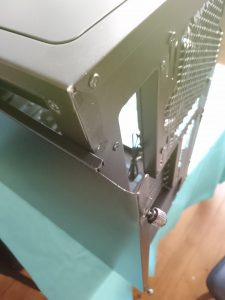My first attempt was not a resounding success, but I’ll get to that. The good news is that the Fractal Define R5 case finally arrived on Monday.
The bad news however, is that it’s damaged:



My first attempt was not a resounding success, but I’ll get to that. The good news is that the Fractal Define R5 case finally arrived on Monday.
The bad news however, is that it’s damaged:


Some of the links in this article are Amazon affiliate links, which pay me a commission if you make a purchase.
I could have brought a plain old Ryzen, a Core i7 or even another Core i5. But with Intel sitting on its hands the past 5 years in the face of no competition, I decided it was time to splash out and reward AMD for not only investing in CPUs again, but making an interesting high-end desktop product while not nickel & diming its customers over PCI-E lanes.
And so, I brought a 1920X.
I don’t really need 12 cores. Other than general browsing, my PC is used for work, (coding) plus a bit of gaming, and a gaming CPU this is not. Running multiple VMs and M.2 devices without slowing down will be nice, but this build is mostly overkill for my needs. And that’s really the point! Continue reading
All of us have data which has value beyond our own lives. My parents’ generation have little record of their childhoods, other than the occasional photo album, but what little records there are, are cherished. My own childhood was well preserved, thanks to the efforts of my mother. Each of my brothers and I has a stack of photo albums, with dates and milestones meticulously documented.
Today, we are generating a massive amount of data. While the majority of it will not be of interest to future generations, I believe preserving a small, selective record of it, akin to the photo albums my mother created, would be immensely valuable to my relatives and descendants – think of your great grandparents jewellery, a photo album of your childhood that your parents created, immigration papers of your predecessors.
Modern technology allows us to document our lives in vivid detail, however the problem is that the data is transient by nature. For example, this blog is run on a Linode server – if I die, the bill doesn’t get paid and Linode deletes it. If Linode goes away, I have to be there to move it to a new server. If Flickr goes away, my online photos are lost. If Facebook goes away, all that history is lost. Laptops and computers are replaced regularly, and the backups created by previous computers may not be readable by future ones, unless we carry over all the data each time.
In part one of this series (this article) I document the problems of common backup solutions for archival storage, with reference to my own set-up. In part two, I’ll detail my “internet research” into optical BD-R media and how it solves these problems, and in part 3 I’ll deal with checksums and managing data for archival (links will be added when done).
Part 1 is fairly technical, so if you just want safe long-term storage, install and configure Crashplan, and skip to part 2.
I received an email via the contact form on this blog, but was unfortunately unable to reply as the email address used was rejected by gmail’s mail server… Luke, I hope you don’t mind me publishing your question and my reply publicly.
Continue reading
Unticking a box might seem like a small thing, but consider the following:
We are not in the 90s any more. Apple, Microsoft and Google have all managed to make updates a 1 touch process (or less), and this is the expectation of your users.
So stop being precious about distribution, but in the very least, stop abusing the update process as a marketing opportunity. It is irresponsible and annoying to millions of people every day.
This blog has just moved from a Rackspace Cloud host to Linode, which offers a lot more specification for the pound (quadruple the ram for one).
At the same time I’ve migrated from CentOS + Apache to an nginx + php-fpm setup, which is not exactly easy for WordPress, but it feels good to be in the modern era!
Let me know if you notice any problems :)